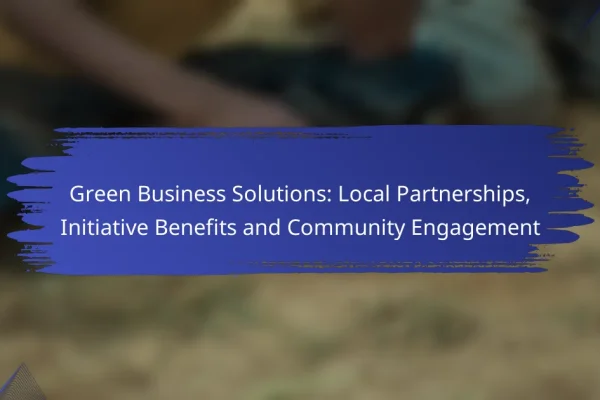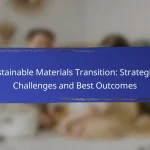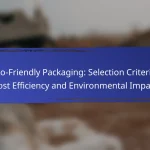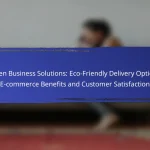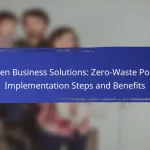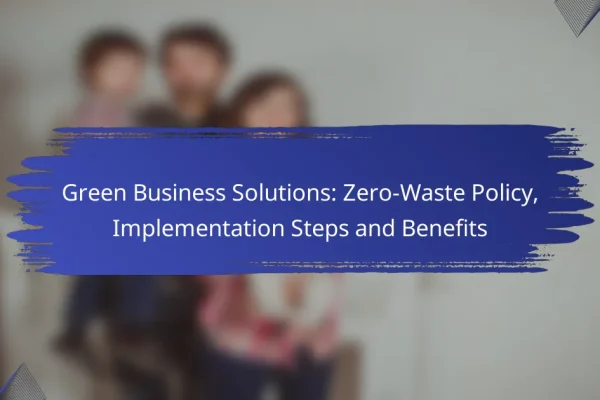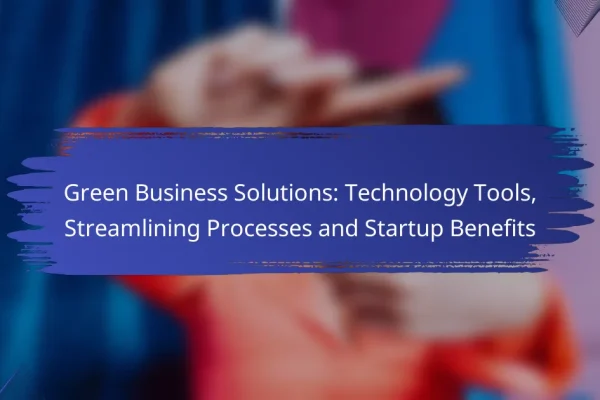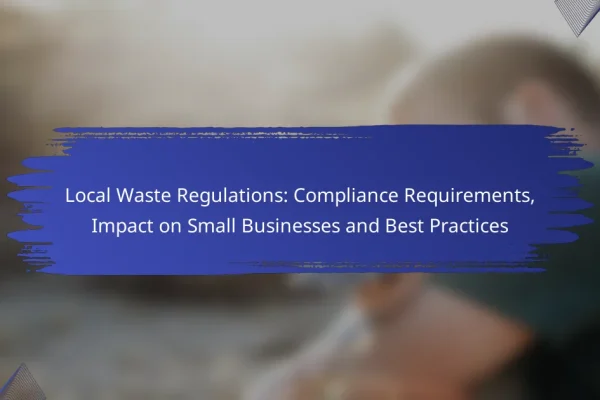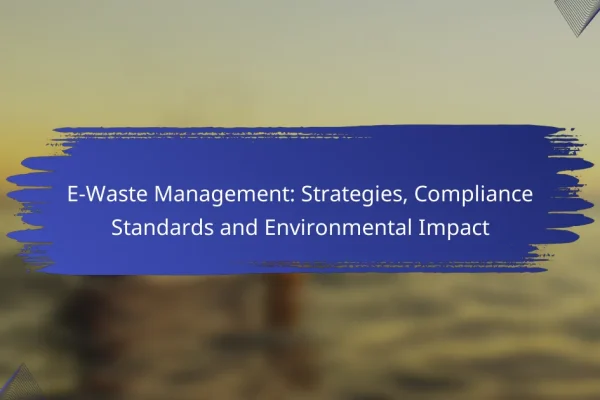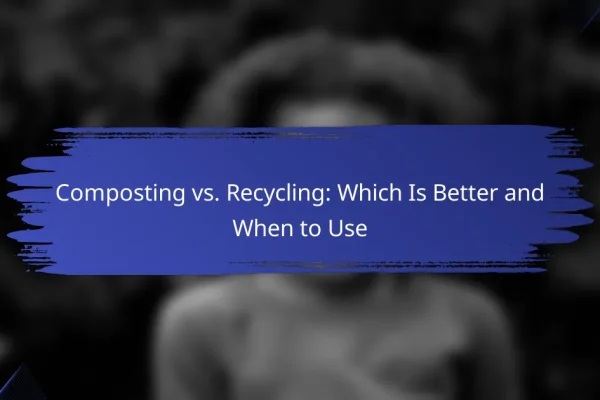What are the best waste management solutions for green businesses?
The best waste management solutions for green businesses include recycling programs, composting initiatives, waste-to-energy systems, zero waste strategies, and eco-friendly disposal services. These approaches help minimize environmental impact while promoting sustainability and efficiency.
Recycling programs
Recycling programs are essential for reducing landfill waste and conserving resources. Businesses can implement recycling by setting up designated bins for paper, plastics, metals, and glass, ensuring proper sorting and collection.
To maximize effectiveness, educate employees on what materials can be recycled and consider partnering with local recycling facilities. Regular audits can help track progress and identify areas for improvement.
Composting initiatives
Composting initiatives convert organic waste into valuable compost, enriching soil and reducing landfill contributions. Businesses can start composting by collecting food scraps, yard waste, and other biodegradable materials in designated bins.
Engaging staff in composting practices and providing clear guidelines can enhance participation. Local regulations may dictate how composting is managed, so it’s wise to stay informed about any relevant laws.
Waste-to-energy systems
Waste-to-energy systems convert non-recyclable waste into usable energy, such as electricity or heat. These systems can significantly reduce the volume of waste sent to landfills while generating renewable energy.
Businesses should evaluate the feasibility of such systems based on local infrastructure and regulations. Collaborating with waste management companies that specialize in waste-to-energy can streamline the process and ensure compliance.
Zero waste strategies
Zero waste strategies aim to eliminate waste by redesigning resource life cycles. This involves reducing, reusing, and recycling materials to achieve a closed-loop system where all products are reused or recycled.
Implementing a zero waste strategy requires a comprehensive assessment of current waste practices and setting measurable goals. Engaging employees and stakeholders in the process can foster a culture of sustainability.
Eco-friendly disposal services
Eco-friendly disposal services focus on minimizing environmental impact when disposing of waste. These services often prioritize recycling and safe disposal methods for hazardous materials.
When selecting a disposal service, look for certifications and practices that align with sustainability goals. Regularly review service agreements to ensure compliance with environmental standards and regulations.
How can businesses implement effective waste management practices?
Businesses can implement effective waste management practices by adopting systematic approaches that reduce waste generation, enhance recycling, and promote sustainability. Key strategies include conducting waste audits, training employees, and setting measurable goals to track progress.
Conducting waste audits
Conducting waste audits is a critical first step in understanding the types and quantities of waste generated by a business. This process involves analyzing waste streams to identify areas for reduction and recycling opportunities. A typical audit may take a few hours to a couple of days, depending on the size of the operation.
Businesses should categorize waste into types such as recyclable, compostable, and landfill waste. This categorization helps in creating targeted strategies for waste reduction. Regular audits, ideally every six to twelve months, can help track improvements and adjust practices as needed.
Employee training programs
Employee training programs are essential for fostering a culture of sustainability within a business. Training should cover proper waste segregation, recycling practices, and the importance of reducing waste. Engaging employees through workshops or seminars can significantly enhance their understanding and commitment to waste management.
Consider implementing ongoing training sessions and providing resources such as posters or digital materials that reinforce best practices. Recognizing and rewarding employees for their efforts in waste reduction can further motivate participation and compliance.
Setting measurable goals
Setting measurable goals is vital for tracking the effectiveness of waste management initiatives. Businesses should establish specific, achievable targets, such as reducing waste by a certain percentage within a defined timeframe. For example, aiming to reduce landfill waste by 20% over the next year can provide a clear focus.
Regularly reviewing progress against these goals allows businesses to make data-driven decisions and adjust strategies as necessary. Utilizing metrics such as waste diversion rates or recycling percentages can help in assessing overall performance and identifying areas for improvement.
What are the benefits of sustainable waste management?
Sustainable waste management offers numerous advantages, including cost savings, enhanced brand reputation, and compliance with regulations. By adopting eco-friendly practices, businesses can reduce expenses, improve their public image, and meet legal requirements effectively.
Cost savings
Implementing sustainable waste management can lead to significant cost reductions. Businesses can lower disposal fees by minimizing waste generation and increasing recycling efforts. For instance, companies that adopt composting can reduce their waste disposal costs by up to 30%.
Additionally, investing in waste reduction technologies can yield long-term savings. For example, using digital documentation reduces paper waste and associated costs. Regularly reviewing waste management practices helps identify further opportunities for savings.
Enhanced brand reputation
Adopting sustainable waste management practices can greatly enhance a company’s brand reputation. Consumers increasingly prefer businesses that demonstrate environmental responsibility. By promoting eco-friendly initiatives, companies can attract and retain customers who value sustainability.
Engaging in community recycling programs or reducing plastic use can also foster positive public relations. Highlighting these efforts in marketing materials can further strengthen brand loyalty and differentiate a business from competitors.
Regulatory compliance
Effective waste management is essential for meeting local and national regulations. Many countries have strict laws regarding waste disposal and recycling, and non-compliance can result in hefty fines. By implementing sustainable practices, businesses can ensure they adhere to these regulations.
Staying informed about changes in waste management laws is crucial. Regular audits of waste practices can help identify compliance gaps and mitigate risks. Engaging with local environmental agencies can provide valuable resources and guidance on best practices for regulatory compliance.
What criteria should businesses consider when choosing waste management services?
Businesses should evaluate service reliability, environmental certifications, and cost-effectiveness when selecting waste management services. These criteria ensure that the chosen provider meets operational needs while adhering to sustainability goals.
Service reliability
Service reliability is crucial for maintaining consistent waste disposal and recycling practices. A reliable waste management provider should have a proven track record of timely pickups and minimal service disruptions.
To assess reliability, businesses can check customer reviews, request references, and inquire about the provider’s contingency plans for unexpected events. A reliable service typically offers flexible scheduling options to accommodate varying waste volumes.
Environmental certifications
Environmental certifications indicate a waste management company’s commitment to sustainable practices. Look for providers with certifications such as ISO 14001, which demonstrates effective environmental management systems.
Certifications can also include local or national standards that ensure compliance with regulations. Choosing a certified provider can enhance a company’s reputation and align with corporate social responsibility goals.
Cost-effectiveness
Cost-effectiveness involves evaluating the overall value of waste management services relative to their price. Businesses should compare quotes from multiple providers while considering the range of services offered.
It’s essential to look beyond the initial cost and assess potential savings from recycling programs or reduced landfill fees. A cost-effective provider may offer bundled services that lower overall expenses while promoting sustainability.
What are the local waste management regulations in major US cities?
Local waste management regulations vary significantly across major US cities, focusing on disposal, recycling, and composting practices. Understanding these regulations is essential for businesses to ensure compliance and promote sustainability.
Los Angeles waste disposal laws
Los Angeles has strict waste disposal laws aimed at reducing landfill waste. Businesses must adhere to the city’s Zero Waste LA program, which mandates that commercial establishments divert at least 50% of their waste from landfills.
Additionally, businesses are required to provide recycling bins and educate employees about proper disposal methods. Failure to comply can result in fines and penalties, making it crucial for businesses to stay informed about local regulations.
New York City recycling mandates
New York City enforces comprehensive recycling mandates that require businesses to separate recyclables from regular waste. The NYC Department of Sanitation outlines specific materials that must be recycled, including paper, cardboard, metal, glass, and certain plastics.
Businesses must also participate in the Commercial Waste Zone program, which aims to streamline waste collection and promote recycling. Non-compliance can lead to significant fines, so it’s essential for businesses to implement effective recycling practices.
Chicago waste management policies
Chicago’s waste management policies focus on reducing waste through the Chicago Recycling Ordinance, which requires businesses to recycle a minimum percentage of their waste. The city encourages the use of composting and has specific guidelines for organic waste disposal.
Businesses must also register with the city to ensure compliance with waste management regulations. Regular audits and inspections are conducted, so maintaining proper waste records and practices is vital for avoiding penalties.
